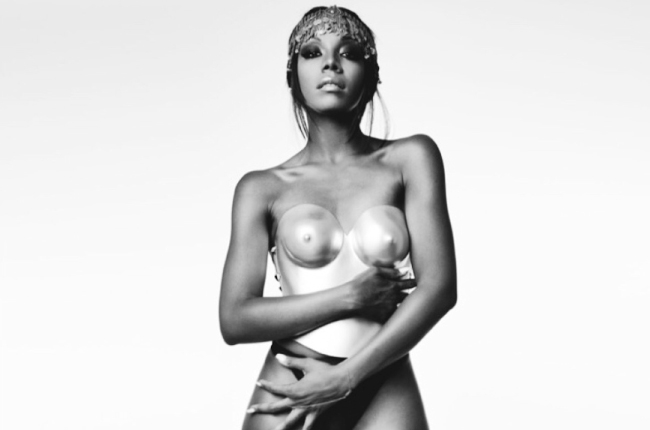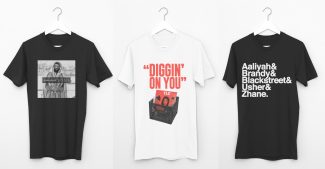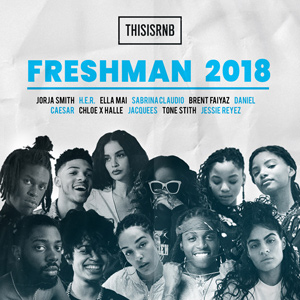Dawn Richard needs no introduction to music lovers. As a founding member of the platinum-selling girl group, Danity Kane, and later one-third of Bad Boy Records’ Diddy-Dirty Money, Richard has paid her dues both in the studio and on the stage.
But these days Richard is rolling solo. Off the heels of her critically-acclaimed debut full-length album, Goldenheart, the 31-year-old singer is back with the same attitude, but different sound.
Blackheart, the second part of a trilogy conceptual album, is Richard’s musical statement piece. It’s dark, introspective and unlike anything some listeners could expect. Not to mention, it’s already climbed to the No. 1 spot on the iTunes electronic chart. Though her sound has often been coined “progressive R&B,” Richard says she’d rather not be put into a box. Instead she just wants her music to be accepted for what it is: undefined.
In an exclusive interview, Richard tell us the story behind her “heart” trilogy, why former DK bandmate Aundrea Fimbres is the only feature on the album and why she prefers to be a genreless artist. Check out that and more below!
ThisIsRnB: Talk about your new project, Blackheart, and the message behind it.
Dawn Richard: It’s the second installment of the trilogy. You go through your beginning, your fall and your recovery. BlackHeart is the fall. Goldenheart was this naive idea that everyone would love me. Everyone would love me and get it, and I would be this warrior coming in and slaying everybody and the reality was that wasn’t the case. Blackheart is after I’ve been through these battles and I look at my hands with all of this blood on me, I kind of realize I lost a lot of good things in the process. It’s the realization that not only is that okay, but there’s strength in the fall. Dark isn’t necessarily bad. Your darkness might be your best hour. Blackheart is that difference between being naive and now being realistic and saying things a little less metaphorically and more real. Changing sonically, going from a more old middle age vibe to a more current, modern, futuristic idea. It’s an evolution.
Do you have a song on the album you connect with the most, and why?
DR: They change, but “The Deep” is one of my favorite records for a lot of different reasons. For one my father and I wrote it. It was around the time that I found out my dad had cancer (Hodgkin’s Lymphoma). And then my grandmother died literally five, six months ago. And then the DK situation happened. It was back to back. I felt like I had a realization about myself that I never fell in love shallowly. It was always deep. It’s either all or nothing. So writing that record and I really identified with the fact that there is no shallow waters in life for me. So I wrote a record that was about us three and how our take on life is. I love that there are no runs. I almost wanted it to sound like some of the older records that I used to love. It’s the first time I’ve done a record that simple. Literally just speaking about something honest and being real about it. I wasn’t trying to sing it, I was talking to someone about it. It was a conversation with myself and realizing that’s who I am as a person. It’s never going to be little, it’s always going to be all or nothing.
Your former bandmate Aundrea Fimbres is on the album, which is the first time you’ve had a feature on one of your projects. How did that song and decision come about?
DR: Aundrea is the only feature. I never do features, number one because they cost ridiculously too much. Number two, I don’t like to be co-signed. I want people to love it because they love it, period. Drea was the exception because honestly the “Phoenix” record was originally for [Danity Kane]. All girls were on it. Drea really loved this record and really pushed for it to be on the [DK3] album, but it didn’t make the cut. It was not the way it sounded now. It’s a completely different record. I changed the dynamic of the record completely because I thought if we were really going to do this it had to sound like a Dawn record, because it originally sounded like a pop, Danity Kane record. I had to make it sound like more of what this album was. Aundrea was like “do what you want.” It’s still me.
It was originally about us (DK) rising together. I think now we’ll just rise separately and there’s nothing wrong with that. She said keep me on it and I was honored because I thought no one would do that hook like her. There’s no one. She’s pop music to me. I love her voice and always have. Her and I have always been the bulk of the hook in our formula. She would do top, I would do octave. That’s now we did our formula. We weren’t [the lead singers of the group], but I will say we blended very well together. Producers loved that, and that was their choice. I think it becomes hard when you’re in a girl group and everyone wants that formula too. It just so happened [Aundrea and I] did a good job at that and got comfortable with that sound together. I think that’s why people like [“Phoenix”] because it reminds them of that first album sound.
Describe the meaning behind your album cover, which depicts your face and another face on top of it.
DR: People think I’m putting on a new face. I’m a huge fan of art, and I always wanted people to be able to look at something and find their own definition of it. That’s in music and in everything, their own opinion, bad or good. When I did this cover and this album, I wanted this whole trilogy to be about it not being about color, race, genre or anything. It was about the heart of the music. I made the face look as if it were a man. It does not have a color, it’s just a molded face. I wanted to put that on to symbolize that this is a female, this a male, this is clear, this is black, so you see me and then you see this kind of bland, neutral color to really let people understand that now I’m putting on another face, another color, another gender. There is no color to this…to really symbolize this is not about me. It’s about the music. It’s bigger than a female, it’s bigger than a man. These are trying times right now. We need people to see that it’s beyond the racial issues that we’re going through. Beyond the battle of female and gender and feminism and all these things we’re fighting for. I want people to know that there is a home, a safe haven where there isn’t anything but music. That’s what I’m hoping for and that’s what the cover stands for. As a person who loves art I want the people to decide what they see in it. I love the fact that people are looking at it and coming up with these weird ideas of what they think it is. That’s art and that’s what I wanted people to get from that.
Describe the concept of the “heart” in all your projects, as it is also what you call your fans (“hearts”).
DR: My first dream was that at the end of all this, people would take off their armor and we would be invisible and the only thing we would be able to see is our hearts. That was the whole point of this [album theme and movement]. The heart is the continuing drive because the heartbeat is the driving force between all of this musically. If you listen to all the songs there’s this constant 808. It’s almost aggressive at all points throughout this entire album. That’s the symbolism of the hearts being present. We are passionate beings. I think sometimes, whether right or wrong, our hearts have good intention. I think when we get back to that–we strip ourselves of everything and we get to the sole purpose of it–it is based off the passion. That’s what the heart theme has always been. We call this heart music.
People always try to put this shit in a genre. They try so hard. They called me the electro-pop R&B girl. I get it and thank you for trying, but you can’t [define my music], because we put a record out like “Castles,” which was something a little bit on the urban side, and then put out “Phoenix” the next day, which is super pop. They all can exist together and that makes people uncomfortable, because they want so badly to box it. But the hearts never question it. They just want to hear and feel it. That is what the heart represents and what this heart theme has been. This is what the music is about; how does it make you feel? That’s all I care about.
-Interview by Gerren Keith Gaynor





